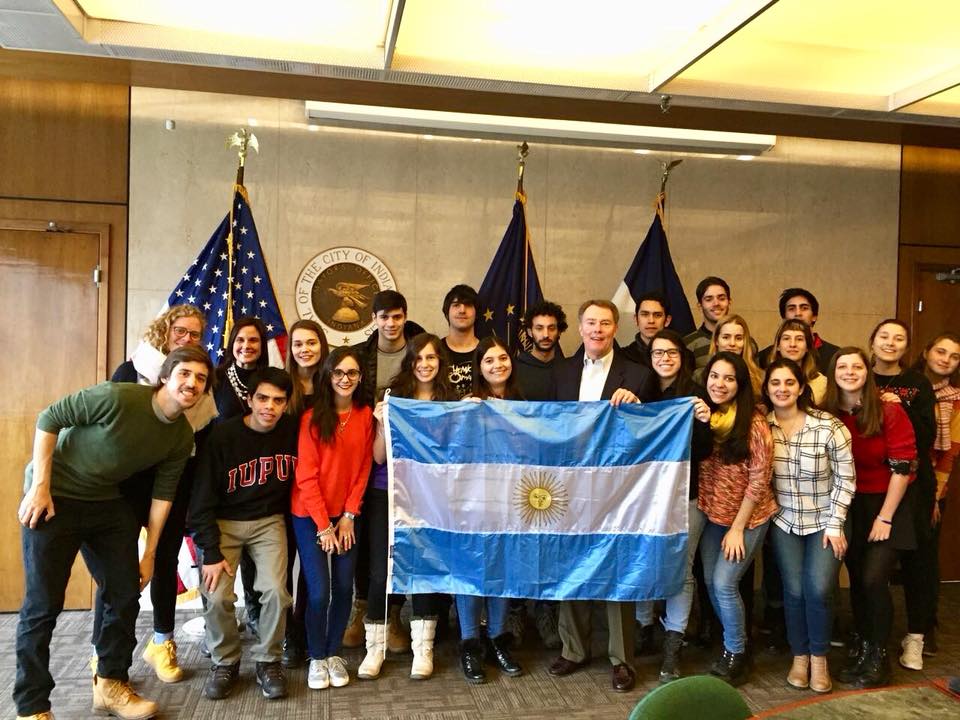Argentina is a country located in South America. It is home to an incredible variety of landscapes, wildlife, and thanks to the port city of Ushuaia, Argentina even serves as the gateway to Antarctica, the ice continent.
From the vineyards in the center of the country, to the Andes mountain range in the northeast, to the colorful and bustling capital Buenos Aires, Argentina has a lot to offer as a study abroad destination.
Argentina – Quick facts and figures
| Capital | Buenos Aires |
| Language | Spanish |
| Population | 44.9 million |
| Area size | 2,780,000 km² |
| International students | 90,000 |
| Academic year | March – December |
| Currency | Argentine Peso (ARS) |
| Calling code | +54 |
| Time zone | GMT-3 |
Argentina is a major wine producer and is known for this around the world. But there is much more to Argentina than just delicious pinot grigios and merlots.
The country also benefits from a wealth of natural resources, such as gas and petrol, and heavy steel and car manufacturing. This makes Argentina a particularly attractive place to study a STEM subject.
Argentina is also a great place to develop your language skills, thanks to Spanish being its national language.
However, even though Spanish is one of the most widely spoken languages in the world, many Argentine schools offer programs that are taught in English.
But it is Argentina’s vibrant, living culture for which it is probably best known internationally. Latin dancing, colourful costumes, Day of the Dead celebrations and infectious ballroom music capture our imagination. Argentina has so much that is just waiting to be discovered.
Studying in Argentina: Education in Argentina

As Argentina was a Spanish colony until it gained independence in 1853, it still maintains a higher education system that is very similar to that of many European countries.
Argentina has both state universities, such as the prestigious University of Buenos Aires, and private institutions, such as the Universidad Austral.
These schools sometimes specialize in specific areas (science, engineering, humanities, etc.), while some offer a variety of courses.
Think of this range as similar to the Juilliard School of Music’s major versus Cornell’s broader range.
A bachelor’s degree takes three to four years to complete, depending on the subject and pace of study.
Postgraduate degrees take one to three years to complete, depending on the subject area and level of research required.
PhDs take four to six years to complete, with some taking up to eight years. As you progress through your PhD studies, the possibility of a paid teaching job opens up.
However, please note that degrees awarded by smaller, lesser-known institutions may not be recognized elsewhere, particularly in Europe and North America.
In some cases, they may not be recognized outside of Argentina. Please do some research before applying.
As for how you study, it’s the same as in most countries. It’s a mix of lectures, readings and independent study. If you’re studying a practical subject, you’ll also spend time in a lab or workshop.
Studying in Argentina: visas and student permits
If you are looking to study in Argentina, you will most likely need a visa. The process varies depending on your nationality, so this is a more general overview. Check with your local Argentine representation for full requirements before applying.
If you only plan to spend a semester in Argentina, then you won’t need a visa if your passport is from a visa-exempt country. Stays of up to three months do not require a visa, even if you are studying rather than strictly a tourist.
However, you will need a visa if you intend to stay for more than ninety days.
Here’s how to apply for an Argentine study visa:
- Gather your documents:
- Passport (must be valid for six months after completion of your studies)
- Photocopy of each page of your passport
- Two photographs
- Acceptance letter from an Argentine school
- Criminal Record Check
- Receipt of payment for visa fee (this varies, but is usually around $100 paid in cash)
- Birth certificate
- Proof of finances for living costs
- Proof of proficiency in the language of study.
- If your documents are not in Spanish, you must obtain a notarized translation.
At this point, you will arrive in Argentina as a tourist. You must then visit the Immigration Office in Retiro to convert your tourist entry into a study visa.
Your immigration officer will then review your documents. If they are approved, you will obtain a Preliminary Certificate of Residence. This legally allows you to remain in Argentina.
Twenty days later, you must return with your preliminary residence certificate and exchange it for your study permit.
Study permits are not valid for the duration of your studies. They are, at most, valid for six months.
This process will need to be repeated in its entirety at least twice a year throughout your time in Argentina.
Similarly, if you intend to study in Argentina for more than one calendar year, you will need to leave the country after two application cycles before re-entering as a tourist and beginning a third cycle.
Studying in Argentina: housing and living costs
Due to Argentina’s notorious economic problems, the cost of living is high for Argentines and is rising.
But, as a foreign citizen, you will find that the cost of living is acceptable and significantly lower than in many European countries or the United States. As in many countries, the cost of living is generally higher in the capital.
Since Buenos Aires is where most international students are located, it is this city that will reflect the following costs:
Some average costs of living in Buenos Aires are (in ARS and USD):
- Monthly rent (1 bedroom apartment): 22,600ARS ($275)
- Utilities (monthly average): 4600ARS ($ 55)
- Monthly public transport pass: 1260ARS ($15)
- Food (cheap restaurant): 600ARS ($ 7.30)
- Coffee: 150ARS ($ 1.80)
- Milk (1 liter): 65ARS ($ 0.80)
- Vegetables (1 kg): 60ARS ($0.75)
- Eggs (dozen): 130ARS ($ 1.60)
- Water (1.5 liters): 70ARS ($ 0.85) *
- Chicken (1kg): 290ARS ($ 3.55)
- Wine (bottle): 220ARS ($ 2.70)
- Bread (loaf): 105ARS ($ 1.30)
* It is safe to drink tap water in Buenos Aires. However, outside the city, it is best to stick to bottled water.
The average cost of living for a person in Buenos Aires is approximately 35,500 ARS ($430) per month.
Argentina’s affordable prices and the vibrancy of Buenos Aires combine to make Argentina a study abroad destination where you can enjoy a cosmopolitan lifestyle on a shoestring budget.
However, be aware that unless you are fluent in Spanish, it can be extremely difficult to find work in Argentina.
The country is also famous for its bureaucracy, so this could compound any problems. You will need to have enough money to cover yourself from other sources.
Argentina is a cash-driven country, but cards are becoming more common, particularly in Buenos Aires.
However, chip and pin cards are sometimes not accepted, so make sure you carry enough cash with you at all times.
Healthcare is free, courtesy of the state, for both citizens and residents. Your student visa counts you as a temporary resident and gives you access to state healthcare.
However, even in some parts of Buenos Aires, state healthcare is extremely basic. Some people, both Argentine and foreign, choose to take out private health insurance once they arrive in Argentina.
Studying in Argentina: tuition fees and scholarships.
Argentina’s higher education system is divided between the public and private sectors. Tuition fees reflect this.
At public universities, there are no tuition fees. Once you have your Argentine study permit in hand, you are exempt from any and all fees. Studying at both the undergraduate and graduate level is completely free of charge.
However, this is not the case with private universities. Private universities in Argentina are businesses and as such need to have a healthy turnover.
Fees are largely unregulated by the government but generally range from US$5,000 to US$15,000 per year.
The large variation is because more practical programs, such as medicine or engineering, cost more to run, so they cost more to study.
Graduate program costs at private universities can be upwards of US$15,000, meaning fewer international students are enrolled in graduate programs at private Argentine universities.
Studying in Argentina: language and culture.

The official language of Argentina is Spanish. However, there are several minority languages, including, interestingly, Welsh.
This reflects Argentina’s diversity, with First Nations tribes and peoples living happily alongside the descendants of European settlers.
English is increasingly spoken throughout the country, especially in Buenos Aires. As is the case in much of South America, younger people are more likely to speak English than older people.
As Argentina was a Spanish colony until 1853, Spanish and Mediterranean cultures have had a huge impact on Argentine society.
If you have been to Spain, you will already be familiar with the after dinners, the magnificent wines and the colourful national costumes. This was actually carried over to Argentina.
Over time, it changed and moulded to become something uniquely Argentine. It can be quite difficult to pinpoint exactly. The best way to get to understand Argentine culture is to experience it for yourself.
As exotic and tempting as Argentina may be, there are a few things to keep in mind.
First, Argentina’s economy can be unstable. The country is prone to defaulting on its debts, and this takes a huge toll on the peso. It can mean that overnight, the cost of basic goods skyrockets.
Even when this happens, the cost of living in Argentina is still significantly lower than in major US cities and many European cities.
Unlike other Latin American countries, such as Brazil or Venezuela, Argentina does not have to deal with a high crime rate. But, as is the case all over the world, petty crime, such as pickpocketing, still occurs.
As you would in London, Chicago or New York, keep an eye on your surroundings and keep valuables close to you. If you do this, Buenos Aires is perfectly safe.
Studying in Argentina: Application process.
Applications to universities in Argentina are not made through a central portal, but rather the requirements are set and overseen by the government.
You can apply to up to three programs at three different schools in Argentina in one application cycle.
Broadly speaking, this is how to apply to universities in Argentina:
- First, translate the application instructions on your chosen university’s website. These will usually be in Spanish, even if the program you are applying to is taught in English.
- Gather your documents that prove your academic history, nationality, and English language skills. You will need a notarized translation of these documents into Spanish.
- Submit translated documents to the school of your choice along with a statement of purpose.
- Pay the application fee. This can be up to US$100.
If you are accepted, you will receive an acceptance letter written in both Spanish and English.
You will need to respond to this letter to confirm your place and begin preparations to study abroad in Argentina.


